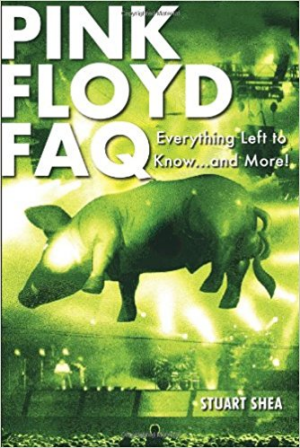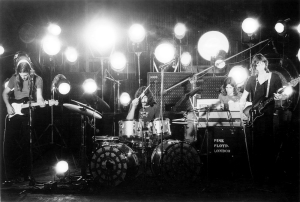2010-06-26
Pink Floyd FAQ - Stuart Shea

In my very early days of Internet I wanted to know everything of my favourite band: Pink Floyd. Webpages were still something very exotic, and a webpage that changed its appearance once a month even more so, but luckily there was Bear's Echoes mailing list that I still read every day for over a decade and half now.
Subscribing to Echoes would automatically give you a copy of the latest Echoes Pink Floyd FAQ, maintained by that monument of Floyd oddities Gerhard den Hollander. Divided in 10 sections it learned me more about the brothers Floyd than anything else, I kept it close to me just like that other, lavishly illustrated, monument of knowledge and wisdom, Pink Floyd, The Visual Documentary (1980) by (Barry) Miles.
The Echoes FAQ is not updated anymore since 1999, although a feeble attempt to resuscitate it was once made a couple of years ago, but there are zillions of websites and blogs dealing with those matters nowadays and in case of doubt, there will always be Wikipedia. Mailing Group FAQs are now as hip as a telex machine was when the fax came out. So it goes.
Thus when Amazon nicely proposed to send me Pink Floyd FAQ from Stuart Shea I followed their advice, mainly because my memories of the original Pink Floyd FAQ were still short and sweet. The moment I clicked I felt remorse because this book could easily be a rehash of the original FAQ that I already had, updated with news that I already knew and the four reviews I found ranged from "this is a great book" to "the book is one of the most useless publications about that band in years". Nice.
Let me start with the obvious. The book is not half as bad as I feared it would be but neither is it as good as a book could be that pretends to contain a FAQ, a whole FAQ and nothing but a FAQ. The subtitle Everything Left to Know… and More! (exclamation point included) is a bit overzealous if you ask me.
The book does not give a chronological overview of Pink Floyd but ranges its subjects by the subject, as shows the table of contents that you can consult here. Unfortunately the book has got no index, what duly pisses me off, so if you want to know something about, let's say: You Gotta Be Crazy, there is no other way to find it than to start reading the bloody thing all over again. So called biographies and reference books (as a FAQ, by definition should be) without an index (or an alphabetical or chronological filing system) are immediately put aside by me and won't be touched again. Ever. Probably the author won't care, the book was sold anyway.
Got A Moment?
Some of the chapters look like they have been inspired by these non informational page filling articles in pop magazines that keep on appearing whether you like it or not.
What are ten great Syd Barrett moments?
What are ten great David
Gilmour moments?
What are ten great Roger Waters moments?
What are
ten great Rick Wright moments?
and last but not least the quite ridiculous…
What are ten great Nick Mason moments?
Probably you see it coming, but there is something basically irrational in the previous list. You can most likely find ten memorable Syd Barrett songs in the short period he was with the band (although Stuart Shea can't and cheats by adding Barrett solo stuff), obviously you can find ten memorable Rick Wright collaborations in Pink Floyd, although the song Wearing The Inside Out, that is, in retrospect, his musical testament has been unexplainably overlooked. And so is, Syd almighty, The Great Gig In The Sky. That song, I'm sure, is treated in another chapter, but as the book has got no index, I haven't got a clue where to find that information.
To note down ten notable Nick Mason moments you have to scrape the barrel a bit. Don't get me wrong, I think that Nick Mason probably was the best drummer Pink Floyd ever had and he was a crucial part in creating the classic Pink Floyd sound (on recent albums he insisted to record his drum licks analog instead of digital to name just one useless, but nevertheless interesting, point that is overlooked in the FAQ), but he didn't get a lot of official credits for it.
But let's be honest, only ten great David Gilmour or Roger Waters moments? Roger Waters thinks he has ten great Roger Waters moments between getting out of bed and his morning pee! All fun aside, making a 'ten great moments' list is considered more appropriate for internet fora (with all discussions and no-no-s involved) than for a book.

Bob Dylan Shoes
Although a FAQ can't answer all possible questions, it is - by definition - a list of the most frequent questions, it helps the reader if he finds as much information as possible. If, at chapter 12: what acts influenced Pink Floyd?, Bob Dylan is mentioned it would, perhaps, be interesting to know that Syd Barrett once recorded a tune called Bob Dylan Blues or that Roger Waters covered Knocking On Heaven's Door, but it doesn't. According to Stuart Shea one of the ten most influential bands or artists for Pink Floyd was the legendary disco outfit Chic because Another Brick In The Wall (Pt. 2) carries a hundred-beats-per-minutes beat. I would have preferred to see a reference to AMM or The Soft Machine instead.
And when there is talk of a FAQ, I would also like to have some accurate information as well. Page 132 has a picture from the Floyd with the caption 'The Floyd on an oddly small stage during the early 1970s. By this time, they had graduated to playing large halls'. The fact why the Floyd stands on an oddly small stage is because the picture comes from the movie Pink Floyd: Live at Pompeii (1972). Their rendition of Careful With That Axe, Eugene, however was not recorded in Pompeii but in a studio in France and in order to get them all four on screen they had to be standing close to each other. Simple as that. No need to create an extra Floydian fable when there is no need to do that.
Despite the fact that you can answer a lot of Pink Floyd questions (the original FAQ had 10 sections, each with dozens of questions and answers) several chapters do overlap each other, and this happens more than once. How did the US discover Pink Floyd goes one about their early (American) tours, so does the chapter What were Pink Floyd concerts Like in…, so does The 1972 and 1973 Tours, so does A Pink Floyd live top ten…
Special Guests
What I do like is that some articles have been written by guests that ring distant church bells with Pink Floyd fans: Mark Campbell, Steven Leventhal, Ron Geesin, John Leckie, Toni Tennile, Ginger Gilmour… overall the book is fun to read (and written in an agreeable way) but the bottom line is: this is not a Pink Floyd FAQ and certainly not THE Pink Floyd FAQ. Easily read, but also easily forgotten.
People who don't know nothing about the Floyd are, in my opinion, better off with The Rough Guide To Pink Floyd (Tobby Manning) that combines the band's history, has a discography (with reviews for every album) and a thematic approach like 'Floyd's finest 50' and 'Floyd on Film'. This is an excellent book for starters (and as a Pink Floyd fan for over 35 years I enjoyed it as well).
If you would like an in-depth Pink Floyd biography I can recommend Mark Blake's Pigs Might Fly or, if you have a lot of money, the memoirs of Mr. Nick Mason himself (Inside Out). And for anoraks who want to look up the nitty-gritty there is always The Pink Floyd Encyclopaedia by Vernon Fitch (alphabetically) and Echoes by Glenn Povey (chronologically).
I am not entirely sure what kind of public Stuart Shea wanted to reach with his book but what I am sure of is that, throughout the book, the author likes to ventilate his own opinion rather than to stick to the facts. Here is what he has to say about The Cult of Syd Barrett (p.313):
Some Syd Barrett fans are as sick as the man himself was at his worst. Despite the voluminous evidence of his excessive drug use, physical assaults on girlfriends and business associates, disastrous attempts at recording and gigging, and largely incoherent interviews from his post-Floyd period in the late 1960s and early 1970s, there are those who wish to romanticize his illness as a willful subversion of pop stardom.

